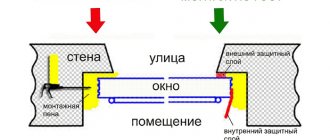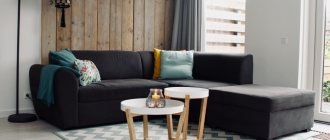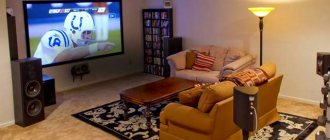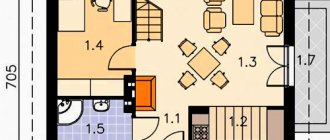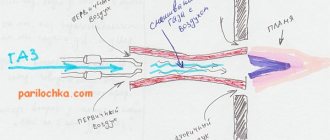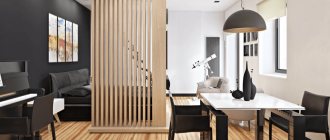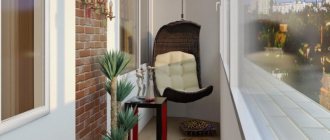For many Muscovites, remodeling an apartment is an opportunity to make their home more comfortable and convenient. This issue is especially relevant for residents of mass-produced houses.
“The current procedure in the capital for approving the redevelopment of premises makes it possible to ensure compliance with construction and sanitary standards when carrying out repair work, and to protect the interests of the owner and his neighbors. Last year, we transferred the government service for approving reconstruction and redevelopment into an electronic form - now residents can submit an application at any convenient time, send documents and track the status of consideration of the application in their personal account on the mos.ru website. The process of obtaining a service has become as transparent and convenient as possible, and the time frame for receiving a decision has been reduced,” said Deputy Mayor of Moscow for Housing, Communal Services and Landscaping Pyotr Biryukov.
By law, major changes to the apartment plan must be approved by the Moscow Housing Inspectorate. Moreover, it is legally correct to obtain permission in advance, before the start of repairs. But in practice, owners often try to approve ready-made alterations. How to properly coordinate renovations in an apartment and what kind of redevelopment cannot be legalized - in the mos.ru material.
What is redevelopment
Redevelopment is called repair or construction - everything that requires changes to the technical documentation (architectural and planning solution). According to the Housing Code of the Russian Federation, this is any work the result of which is reflected in the technical plan of the premises. They can not only affect the apartment itself, but also change the characteristics of the entire house. Therefore, redevelopment and reconstruction require approval.
Strict requirements were introduced due to the fact that redevelopments are often carried out in violation of building codes and regulations. For example, demolition of load-bearing walls in an ordinary high-rise building can lead to partial or complete collapse. Unfortunately, such stories do happen. This violation refers to work that is prohibited. There are two more types of work: those that require approvals and those that can be performed without approval from regulatory authorities.
Registration of changes: why is it needed?
The buyer of an apartment with unauthorized redevelopment may be unable to register the changes, and accepts responsibility for errors made during the work. That is, he can be held responsible (since the apartment is now his property)
return everything to its original state and even force him to pay a fine. Accordingly, therefore, selling an apartment with an unregistered redevelopment is quite problematic, and the current owner, if he wants, for example, to move, willy-nilly is forced to solve this problem.
Registration of changes to the internal configuration of the apartment is necessary for several reasons:
Firstly
, obtaining permission for redevelopment requires a project approved by the city authorities.
A permit issued by the city administration is in itself a guarantee that no mistakes will be made when planning work that would pose a threat to the life, health, or property of the redevelopment initiator and neighbors (for example, destruction of load-bearing structures)
;
Secondly
, registration of changes in Rosreestr allows the state to have up-to-date information about each residential property
(and the number and area of each premises is quite important information)
.
It is possible to arrange a redevelopment, both before the actual work is carried out and after its completion (through the court). However, in order to avoid possible troubles, it is better to adhere to the legal procedure, which will be discussed below.
How to avoid mistakes
Redevelopment rules are regulated by the Housing Code of the Russian Federation, various construction and sanitary standards and regulations, as well as a number of regulations. They protect residents from the wrong actions of their neighbors, says Andrey Kuptsov, head of the engineering survey sector of the State Budgetary Institution Expert Center. The center's specialists examine residential and non-residential premises in apartment buildings to determine the technical condition of load-bearing and enclosing structures after redevelopment, including the development of design documentation.
According to the expert, if the owner of one apartment does everything reliably, using modern materials and technologies, then it is not necessary for another. And this will result, at best, in a conflict with neighbors. Therefore, building standards are the same for everyone.
“The biggest mistake is when people want to improve their living conditions by redevelopment, but forget about the rules. It is impossible, for example, to enlarge the bathroom and kitchen at the expense of living rooms. People think that everything is fine, but it is prohibited. So they worsen the conditions for other residents of the house: incorrect waterproofing - and the neighbors below will experience a flood,” said Andrey Kuptsov. According to him, it is possible to increase the so-called wet zone through the corridor, but this also has its own nuances.
Another common mistake is combining a loggia or balcony with the residential part of the apartment.
“Such redevelopment is prohibited because it disrupts the thermal contour of the building. As a result, there is an additional load on the central heating system, which can lead to significant heat loss and even mold in neighboring apartments. In the capital, in agreement with the Moscow Housing Inspectorate, it is allowed to dismantle the window sill in order to install a wider door block,” says the expert.
The law also prohibits bringing central heating radiators into the loggia. Andrey Kuptsov explains that this is a summer room and the heating system may not withstand temperature changes. “We are forced to refuse technical conclusions and designs, since this work is unacceptable and can lead to a deterioration in the living conditions of other people in an apartment building,” adds the specialist.
According to him, the installation of balconies above the second floor is also prohibited. Such an extension creates additional load on the supporting structures. According to the rules, only residents of the first floors can build balconies for themselves, and only as a non-permanent building. Such balconies on the first floors must be without a heating system, foundation and underground premises. Everything else will have to be dismantled.
In addition, ventilation ducts are not allowed to be hung on the main facades of the house that face the street. This requirement applies to all non-residential premises located on the ground floor of an apartment building. In this case, ventilation should go to the internal facade - in the courtyard of the house. This requirement allows you to preserve the aesthetic appearance of buildings. You can complain about violators to the State Housing Inspectorate of the city of Moscow.
The ventilation duct inside the apartment (between the kitchen and the bathroom) is demolished by enterprising residents, increasing the number of precious square meters. This literally blocks the flow of air into the apartments above and below the riser. The law will oblige you to return everything as it was.
Houses with gas equipment also have their own nuances. For example, you can move the slab to another location with the approval of the Moszhilinspektsiya and provided that the work is carried out by Mosgaz. But you cannot combine a kitchen with a gas stove and a living room. In rooms where there is gas, according to the standards, there must be a separate door to avoid the spread of gas if it leaks.
Before making an opening in a load-bearing wall, it is necessary to carry out calculations and obtain approval. In this case, the structure must be well strengthened. It will not be possible to create heated floors using central heating. Heated floors can only be connected to the apartment’s electrical supply and provided that the allocated electrical power is sufficient.
Muscovites also began to get carried away with adding mezzanines inside the premises, says Andrey Kuptsov. The mezzanine area should not exceed 40 percent of the room area. Sometimes owners forget about this and make the “second floor” much larger. However, such an excess leads to an increase in the load on the load-bearing walls.
“Over time, some things are allowed, some things are prohibited. Today the list of prohibitions consists of 26 points,” says the expert. All of them can be found at the link.
How to coordinate redevelopmentRedevelopment: what is possible and what is not
OSS must agree to use the land for unauthorized construction
A family living in an apartment on the ground floor under a social lease agreement built two extensions to the apartment, doubling its area. The reconstructed premises did not violate the requirements of SP-2.1.2.2645-10, fire safety requirements and complied with the technical regulations in force in the Russian Federation. However, the local self-government body refused to preserve the apartment in its renovated state, and the dispute was transferred to the courtroom.
The first instance, and then the court of appeal, satisfied the demands of the apartment residents. The judges considered that the erected extensions do not violate the rights and interests of other citizens, do not threaten their life and health, and comply with sanitary and construction standards. Therefore, according to Part 4 of Art. 29 of the Housing Code of the Russian Federation, the courts allowed the premises to be preserved in a renovated form.
The Supreme Court of the Russian Federation, where the municipality filed a cassation appeal, did not agree with the conclusions of the first two courts. The RF Supreme Court noted that the extension was erected on a land plot that is part of the common property of the apartment building. It is a room with a separate entrance made of a monolithic reinforced concrete foundation with brick external walls and roof. This construction changed the area of the apartment, and also increased the total property of the apartment building due to new enclosing structures.
The Supreme Court of the Russian Federation indicated that in order to carry out such a reconstruction, when the common property of the house is changed, it is necessary to obtain the consent of all owners of the premises in the apartment building (Part 3 of Article 36 of the Housing Code of the Russian Federation). The plaintiffs did not bring the issue to the OCC.
Also significant for the court was the fact that land that was part of the common property of the MKD was used without the consent of the OSS. An extension to an apartment on the ground without obtaining consent for its use may be recognized as an unauthorized construction by virtue of Art. 222 of the Civil Code of the Russian Federation.
The courts of first and appellate instances did not consider these circumstances, so the RF Supreme Court sent the case for a new trial.
Land plot as part of the common property of the MKD
1165512
In a simplified manner
Without approvals, you can make simple repairs to the apartment that will not lead to significant changes. According to Andrey Kuptsov, without approval, you can make an opening in a non-load-bearing wall, if this does not change the load on the floors, and replace plumbing equipment without changing its location. It is also allowed to re-lay the floors if the parameters of the room, such as its height, do not change. A sketch of the work performed must be sent to the Moscow Housing Inspectorate for approval. There is no need to coordinate the replacement of finishing coatings on walls, ceilings, or floors - for example, replacing linoleum with laminate or tiles.
In a simplified procedure, you can agree on the installation of built-in cabinets, the laying or installation of doorways in non-load-bearing partitions, the rearrangement of a sink in the kitchen, or the replacement of a bathtub with a shower within the boundaries of the bathroom.
Special cases of redevelopment
When redeveloping a residential building that is a cultural heritage site, two options for carrying out the work are possible. If this affects the subject of protection, then the design documentation for the adaptation of residential premises must be approved by the Department of Cultural Heritage of the city of Moscow. Otherwise, the applicant submits project documentation to the Moscow Housing Inspectorate, which forwards the documents to the capital’s Department of Cultural Heritage. Its specialists prepare a final decision and forward it to the Moscow Housing Inspectorate.
If a house is recognized as unsafe, then it is prohibited to carry out redevelopment and reconstruction.
And the expert calls the open plan, popular in new houses, quite conventional. In any case, the premises there are planned in advance. “Zoning still remains: where there should be a kitchen or bathroom, you cannot make a living room,” explains Andrey Kuptsov.
If you buy an apartment in a new building, where there is nothing but load-bearing walls, you need to start repairs by developing a project and getting it approved by the Moscow Housing Inspectorate. After this, you can begin repairs.
Built-in wardrobes
The important issue of storing things can be successfully resolved with the help of built-in wardrobes. They require less space to accommodate the same capacity than other storage systems.
Note!
Apartment 40 sq. m.: layout and zoning options for a small apartment. Choosing an interior style, arranging furniture, adjusting lighting (photo + video)Studio apartment 30 sq. m. - advantages of planning a studio apartment. Zoning options, furniture placement (photo + video)
One-room apartment: TOP-130 photos and videos of layout and design options for a one-room apartment. Selection and arrangement of furniture
Among other things, mezzanines up to the ceiling provide additional storage space, which increases the efficiency of using the apartment’s space.
This option is especially relevant when remodeling a small one-room apartment.
Redevelopment by law
Unfortunately, people who started redevelopment do not always consider approvals a matter of prime importance. “As long as you are using the apartment, this may not affect you in any way, unless your redevelopment does not harm other residents. And if you decide to sell your home, a sensible buyer will first of all ask to see a recent technical passport, which is provided by the Moscow City Bureau of Technical Inventory (BTI). And compare it with what actually exists. If the parameters do not match, he will demand a price reduction or legalization of the redevelopment,” says Andrey Kuptsov.
By law, redevelopment must be approved before the renovation begins. To do this, you will need to develop a redevelopment and reconstruction project: it should only be carried out by a design organization with the status of a full member of a self-regulatory organization (SRO). You can check this on the website of the National Association of Surveyors and Designers (NOPRIZ). The State Budgetary Institution “Expert Center” is one of such organizations, and its employees have extensive experience in working with different situations.
Redevelopment can also be done according to a ready-made scheme from the catalog of standard projects already approved by the Moscow Housing Inspectorate. In this case, experts will need to verify on site whether it is possible to carry out the work. “They will check load-bearing and enclosing structures, floors, walls, engineering systems - how reliable their condition is today and how the work that the owner wants to carry out will affect them,” noted Andrey Kuptsov.
From August 2021, it is possible to legalize the redevelopment of an apartment only in electronic form. To do this, you need to collect all the documents and submit an application on the mos.ru website. After all the examinations, usually within 20 days, the owner receives a decision on approval.
If the owner of an apartment wants to legalize a redevelopment that has already been carried out, he must first order a technical report from the design organization on the admissibility and safety of the work performed. But we must take into account that specialists, for example, will have to partially open the walls or floor. “If you made an opening in a load-bearing wall, they will check whether the reinforcement was made, whether it is correct, and make a calculation. If it's wrong, you'll have to redo everything. For redevelopments that have already been completed, they also make sure to check the waterproofing,” says a specialist from the State Budgetary Institution “Expert Center”.
Having received the technical conclusion, you can contact the Moscow Housing Inspectorate with an application for the provision of public services. In this case, the applicant must pay an administrative fine for the illegal work carried out.
Wall cabinets
In conditions of insufficient space, when drawing up a redevelopment project for a one- and two-room apartment, special attention is required to large-sized items that need storage: suitcases, unused bird cages, a sewing machine, sports equipment, a vacuum cleaner and others.
For items of this size and weight, special storage areas must be provided. These include wall cabinets with increased volumes.
Fines and sanctions
The fine for Muscovites for illegal redevelopment of an apartment is set at two to two and a half thousand rubles. For officials in Moscow, fines range from four to five thousand rubles, for legal entities - 40-50 thousand rubles. In this case, the owner will be required to restore the original appearance of the premises. And if this is not done within a certain period, the materials will be sent to court.
Often illegal redevelopments are discovered by neighbors who begin to flood. “If the owner does not respond, they contact the Moscow Housing Inspectorate, its experts will inspect both premises, draw up a protocol, a fine and an order to eliminate the violation. The owner then has two options: return everything to its original position or eliminate the violations and legalize the redevelopment,” says Andrey Kuptsov. At the same time, it will not be possible to ignore the requirements - the owner may even face selling the apartment at auction.
Last year, the Moscow Housing Inspectorate received almost 22 thousand applications for approval of reconstruction and redevelopment. Of these, about seven thousand applications were related to previously completed work. It is difficult for experts to judge how many people do not apply for approvals.
“I don’t think this will cease to be relevant, because people will always have a desire to improve their homes. Everyone wants to improve what they buy. Today apartments are built to be more comfortable than 20–30 years ago. But there are still a lot of people willing,” the expert notes. Therefore, when deciding on a global remodel, you should entrust calculations and approvals to experts.
Bathroom
After redevelopment of the apartment, the number of toilets may increase to two. One of them, the so-called “guest”, should be located near the hallway and reception area, and the second next to the bedrooms.
When there is no need for a second bathroom, its area can be used for a pantry or dressing room. The latter option is only possible if ventilation is available and the risk of leaks is eliminated.
